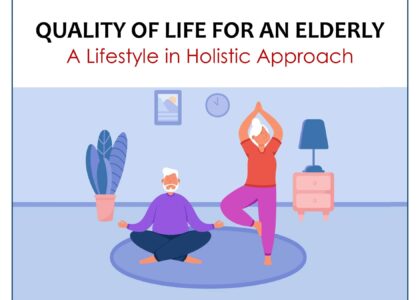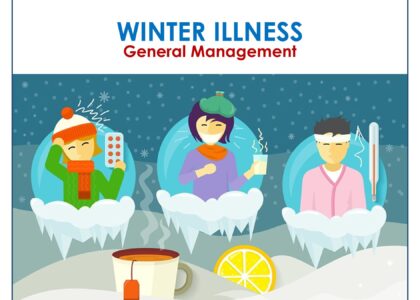Dr. Akansha Pagare, BHMS, MD Scholar
You don’t have to control your thoughts. You just have to stop letting them control you.
– Dan Millman
In today’s fast-paced world, social anxiety is a common struggle for many. Whether it’s the fear of being judged in a crowded room, the anxiety of speaking in a meeting, or hesitation to join new social circles, these feelings have become increasingly prevalent across all age groups. People face not only external pressures but also the internal turmoil these pressures create.
Social anxiety is often exacerbated by the demands of modern living, such as:
- Constant comparison fostered by social media
- Hectic schedules that leave little time for self-care
- Societal expectations to always be at one’s best
These factors contribute to a range of mental health challenges, with social anxiety being a prominent one. While many seek conventional therapies, there’s a growing awareness of holistic approaches like yoga, meditation, counseling, balanced diet, regular exercise, and adequate sleep. When combined with homeopathy, these practices offer a comprehensive way to manage and reduce anxiety.
THE IMPACT OF NEGATIVE LIFE EVENTS
Negative life events can significantly contribute to the development of social anxiety. Experiences such as public criticism, bullying, job loss, or personal failures often leave lasting scars that make social situations daunting.
- A teenager embarrassed in front of classmates might develop a fear of speaking in public.
- A young professional criticized harshly at work might avoid voicing opinions in meetings.
- Someone rejected in a social or romantic context may withdraw from future interactions out of fear of further rejection or embarrassment.
A HOLISTIC APPROACH TO MANAGING SOCIAL ANXIETY
Homeopathy offers a personalized approach to treating social anxiety by addressing the individual’s specific physical, emotional, and psychological state. When integrated with a holistic lifestyle approach, homeopathy can be particularly effective. Here’s how:
1. Yoga and Meditation
Yoga and meditation are powerful tools for managing anxiety. Yoga combines physical postures with breathing exercises that reduce tension in the body and calm the mind. Meditation encourages mindfulness and awareness, helping individuals stay present and reduce the tendency to worry about the future or ruminate on the past. Guided meditation, in particular, can be very effective for beginners, providing structured guidance to achieve deeper relaxation.
2. Counseling and Therapy
Counseling, especially cognitive-behavioral therapy (CBT), is highly effective in treating social anxiety. CBT helps individuals identify and challenge negative thought patterns and behaviors associated with anxiety. Working with a counselor provides support and strategies to confront and overcome fears, making social interactions more manageable. In conjunction with homeopathy, counseling can address both the mental and emotional aspects of anxiety.
3. Regular Exercise
Physical activity is a natural stress reliever. Regular exercise releases endorphins, which are natural mood lifters, and reduces the body’s stress hormones like cortisol. It also promotes better sleep, enhancing overall physical health, which in turn supports better mental health and reduces symptoms of anxiety.
4. Balanced Diet
Nutrition plays a crucial role in mental health. A balanced diet rich in fruits, vegetables, whole grains, and lean proteins helps stabilize blood sugar levels and prevent mood swings. Omega-3 fatty acids, found in fish, flaxseeds, and walnuts, are particularly beneficial for brain health and can help reduce anxiety symptoms. Avoiding excessive caffeine and sugar is also important, as these can contribute to anxiety and nervousness.
5. Adequate Sleep
Sleep is essential for mental and emotional well-being. Lack of sleep can exacerbate anxiety symptoms, making it harder to cope with everyday stressors. Establishing a regular sleep routine, creating a restful environment, and avoiding stimulants before bed can help improve sleep quality. Good sleep hygiene practices ensure that the mind and body are well-rested, making them better equipped to handle anxiety.
COMMON HOMEOPATHIC REMEDIES FOR SOCIAL ANXIETY
Argentum Nitricum: Ideal for individuals who feel anxious before social events or fear making mistakes in public. It’s especially helpful for those who experience anticipatory anxiety and often feel rushed or agitated.
Gelsemium: Recommended for those who experience performance anxiety or feel paralyzed by fear before social situations. This remedy helps individuals who feel weak, want to avoid social interactions, and desire to be left alone.
Lycopodium: Suitable for people who lack self-confidence and fear being judged or criticized. This remedy is helpful for individuals who feel anxious about speaking in public or meeting new people.
Silicea: Used for very shy individuals who fear public speaking and are overly concerned with others’ opinions. It is also helpful for those who have a history of feeling inadequate or have been criticized.
Note ( For the best and most permanent treatment, it’s recommended to consult a doctor. This is a therapeutic medicine, and professional medical advice will ensure the most effective care )
INTEGRATING HOMEOPATHY WITH A HOLISTIC LIFESTYLE
By combining homeopathy with holistic lifestyle changes like yoga, meditation, regular exercise, a balanced diet, and proper sleep, individuals can create a comprehensive strategy for managing social anxiety. This integrative approach addresses the body, mind, and spirit, providing a well-rounded method for overcoming anxiety and promoting overall well-being.
CONCLUSION
Social anxiety can significantly impact one’s quality of life, but with the right approach, it’s possible to manage and reduce its effects. Homeopathy, coupled with lifestyle changes such as yoga, meditation, counseling, exercise, diet, and sleep, offers a holistic and personalized path to healing. If you’re struggling with social anxiety, consider exploring these options with a qualified practitioner to find a treatment plan that works best for you.
Plagarism percentage is 11.1% only
Note ( For the best and most permanent treatment, it’s recommended to consult a doctor. This is a therapeutic medicine, and professional medical advice will ensure the most effective care )











